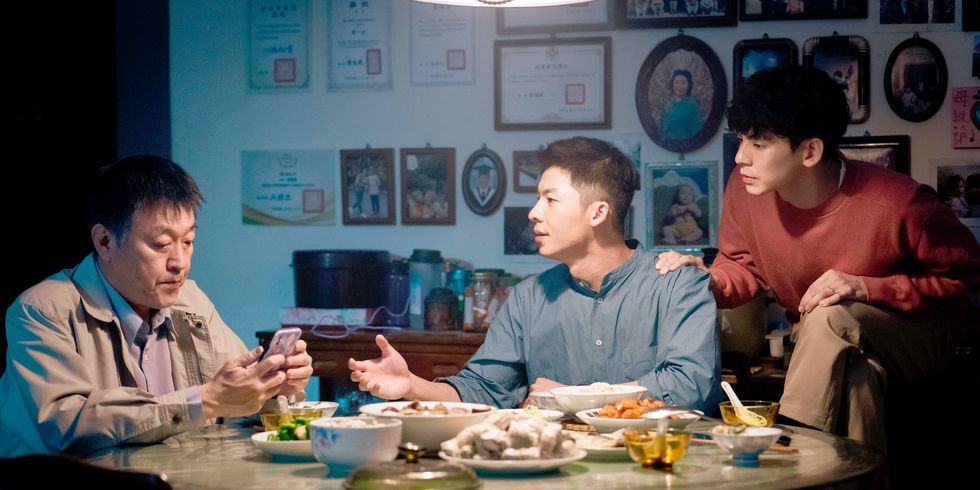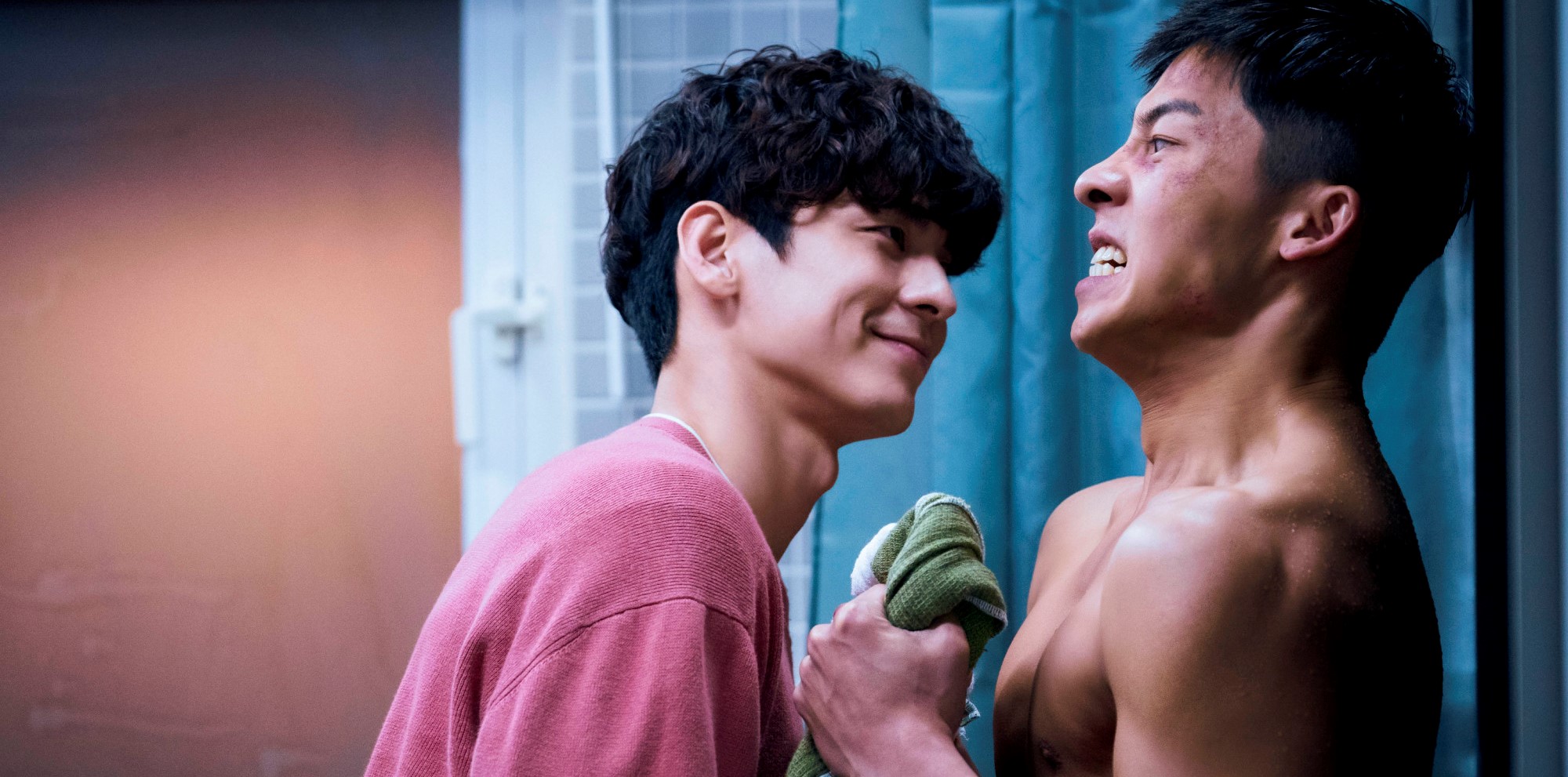In the realm of contemporary Asian cinema, Cheng Wei-hao’s ‘Marry My Dead Body’ stands as a fun embodiment of diverse genres and themes. Beginning as a gay romantic comedy before seamlessly transitioning into a perplexing murder mystery, enriched further by elements of supernatural intrigue and incisive social critique, it is difficult to tag the film in just one genre.
The plot revolves around a homophobic police officer named Wu Ming-han, played by actor Greg Hsu. He is unwilling but compelled to marry a deceased gay man Mao Mao (played by Austin Lin), all to ward off an onslaught of misfortune. After literally shooting himself in the foot mistakenly and getting a demotion at work, he reluctantly agrees to marry a gay ghost. The two don’t exactly hit it off, and Ming-han is constantly scheming to break free from the arrangement, no matter the cost. The only way to end this peculiar partnership is if Ming-han fulfills Mao Mao’s specific wishes, granting him a chance at reincarnation. One of these wishes involves solving the mystery of Mao Mao’s death in a hit-and-run case. Additionally, Mao-Mao seeks a resolution to his past relationship and longs for his father’s acceptance. Spoilers lie ahead!
Marry My Dead Body Ending
The ending can be broken down into two parts – the action showdown between the police and the cartel and the eventual healing of Mao Mao’s spirit so that his soul can be free and ready for incarnation. The movie is also a detailed journey of Wu Ming-han’s character development, who is seen to be a prejudiced homophobe at first, but by the end of the movie is attached to Mao Mao in spirit, as the flesh isn’t really an option.
The finale throws in all the usual suspects while it’s raining plot confetti – a showdown of epic bullet ballet, a plot twist that pirouettes our expectations, our hero playing peekaboo with life and death, enemies reluctantly flipping the script to lovers, and to top it off, a send-off that’s like an emotional hug wrapped in feel-good vibes for the audience.
Who Was the Mole?
Ming-han’s investigation of Mao Mao’s death aligns with another case he is currently working on involving a local drug cartel. Lin Hsiao-yuan is the prime suspect in the hit-and-run of Mao Mao and also the apex figure of the local drug cartel. Mao Mao tries to help on the case and provides valuable intel about Lin Hsiao-yuan, who is skipping town and allegedly the informant among the Police is none other than their Captain Chang Yung-kang.
Ming-han arrives to assist his fellow cops in a shootout against the cartel. In the heat of the fight, Yung-kang bolts to the villain’s layer, sending Ming-han on a chase. The twist arrives when Ming-han realizes that Mao Mao’s belief and provided information was off the mark all this time. The informant wasn’t his superior, but rather policewoman Lin Tzu-ching (Gingle Wang), who’s been straddling both sides unnoticed. Mao Mao had misunderstood a key phone call but immediate concerns overshadow that as Tzu-ching beats down and handcuffs both Ming-han and his boss Yung-kang.
Fuelled by rage, her vengeance is targeted (quite literally) as she crucifies and nails the mobster to a wall using two knives through his palms. The backstory unravels revealing Tzu-ching’s childhood scarred by her mother’s death because of a drug overdose, which was peddled by Lin Hsiao-yuan. She reveals her grand plan of running away with the mobsters money after giving him up to the authorities for Mao Mao’s murder and various other crimes.
Who Was Behind the Hit-and-Run of Mao Mao?
Mao Mao’s case never proceeded because of the lack of evidence. It was Tzu-ching who was behind the disappearing of evidence regarding Mao Mao’s hit and run, a move she did to win the trust of Lin Hsiao-yuan, the drug cartel boss and the culprit for Mao Mao’s death.
Why Was Mao Mao’s Dad Against his Son’s Marriage?
Amidst all its supernatural, goofy and murder mystery themes, there is an unspoken theme of father-son dynamics. At first, Mao Mao’s father might appear as your everyday quintessential grumpy Asian father figures. There is a clear lack of communication and consideration from his end, tainting their relationship. He is shown to be “homophobic” and dismissive of his son’s inherent nature. As the story unfolds it is revealed that he was in fact just looking out for his son by not letting him marry a man who was already unfaithful to his son (hence beating the homophobic allegations). It is a heart warming display of the stereotypical Asian father-son relations, wherein the tough unspoken love reigns supreme at the cost of communication and understanding.
Does Mao Mao’s Spirit Find Peace?
Amidst various subplots, one of the main focal plots of the movie is finding peace and consequently reincarnation for Mao Mao’s spirit. What Mao Mao really needed was his father’s love and acceptance. After Ming-han asks his father to speak as if he is talking to his son, we see Mao Mao’s spirit getting patched up in the literal sense. His fathers love and acceptance sets him free and he departs the realm of the living to reincarnate and move on.

We see a changed Ming-han in the final moments of the film. He is seen talking to Mao Mao’s grandmother and father and is planning dinner with them. His ghost hubby is no longer there but his presence has left a mark in Ming-han’s life as he is seen using a reusable drink container with pro-LGBTQ+ stickers on it. We see a shrine of Mao Mao in Ming-han’s room and Mao Jr reinstates the presence of Mao Mao in all but spirit and flesh. Furthermore, the conclusion brings the concept of love to the forefront. Love, in its various forms, is a central theme throughout the film. The ending highlights how love can transcend boundaries, whether they are societal, temporal, or even supernatural. It underscores the idea that love has the power to heal, forgive, and bring about closure.
Read More : Where Was Marry My Dead Body Filmed?


You must be logged in to post a comment.